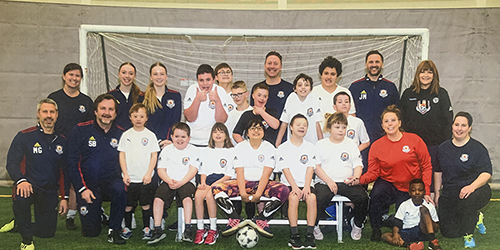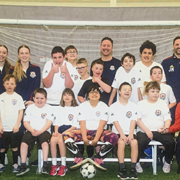Bonivital Soccer Club mobilizes adaptive programming
 When the Bonivital Soccer Club in Winnipeg first launched an All Abilities pilot involving adaptive sport, they created two pathways: one for deaf participants, and one for players who have intellectual or developmental disabilities. It was 2022, and they were eyeing a growing trend of soccer clubs introducing adaptive programming alongside boys and girls leagues as a third facet of their organizational structure. The leadership team saw it as a further opportunity to foster inclusion within their club.
When the Bonivital Soccer Club in Winnipeg first launched an All Abilities pilot involving adaptive sport, they created two pathways: one for deaf participants, and one for players who have intellectual or developmental disabilities. It was 2022, and they were eyeing a growing trend of soccer clubs introducing adaptive programming alongside boys and girls leagues as a third facet of their organizational structure. The leadership team saw it as a further opportunity to foster inclusion within their club.
For Bonivital’s executive director Steven Gzebb, it was about considering the bigger picture of their mandate.
“As a club, not only do we want to cater to those 1 per cent of players that want to go get scholarships and have aspirations to take it to the next level, in reality we also want to create great people on and off the field and foster that lifelong love of the sport,” he told Sport for Life.
The pilot ran through the winter, starting at the end of November, for 12 weeks. At first the leadership team wasn’t sure what type of participants would show up. Would the coaches be accommodating wheelchairs, for example? Making adaptations for blind participants? As the registration number rose, coach Jason Moist saw where the need was strongest at the time – with students from the Manitoba School for the Deaf. Eventually they capped out registration at 30 families.
“With our deaf or hard of hearing group, it was a practice very much like what we would run with other players. We had someone come out as an American Sign Language interpreter, and aside from that it was pretty much a session like you would see anywhere else,” Moist said.
As for the stream involving players with disabilities, coaches quickly learned that the sense of community the practices provided for both the participants and parents was invaluable. Showing up once a week gave them something to look forward to.
“Our practices were very much about skill development, but that was secondary to the community having fun and having a real sense of belonging. For our athletes it’s a chance to come be part of something bigger than themselves, and then the secondary happy accident is that the caregivers and parents who came out to watch have a chance to interact.”
The most important thing for Moist is giving the athletes a sense of belonging and purpose.
“Everybody at the end of the day, no matter who you are, everyone wants to belong to something. This gives these athletes a chance to belong, and a chance to win. They see soccer on TV, and they can say ‘I do that with a team I train with’. They can carry around a Bonivital backpack and say ‘that’s a backpack from my club’. That’s the thing I get out of it, is being able to help them be a part of the community and something bigger.”
Depending on the time of year, Bonivital either hosts their players indoors or outdoors. Because they aspire to give each player a significant amount of attention, they try to keep the coach to player ratio low at approximately 4 or 5 players per coach at most. Now Moist feels one of their hopes going forward is to find other clubs to play against.
“Special Olympics does a great job, and we’ve talked about teaming up with them in the future. They do a variety of things. But as far as a focus on soccer, I believe we’re the only soccer club offering this. So it would be awesome to see other clubs do the same thing so we could get to the point we’re playing against other clubs and growing it from there.”
Bonivital is now fielding requests to introduce programming for adults with intellectual or developmental disabilities, and are running a program for them this summer. The age categories they’re considering are 9 -17 and then 18+. The difference the pilot has made to the culture is instantly noticeable according to Gzebb – particularly following the difficulties of COVID-19.
Engaging New to Canada Participants
Bonivital’s recent pilot project is only one part of their inclusion efforts, alongside their work to engage and even sponsor New to Canada Participants. One family from Syria in particular, with one son missing a leg due to landmine, has been welcomed into their programming and provided with support for program fees. That’s important to the club’s leaders, according to Gzebb.
They try to meet each participant, and each family, where they’re at. The club chooses to cover any costs that newcomer families can’t afford, because they would rather the kids have a chance to play To this end, they’ve partnered with the Winnipeg Newcomer Sport Academy to source future players and share expertise by providing qualified coaches to assist in running quality soccer sessions.
“In Manitoba, the biggest barrier in sport is financial. And I know KidSport and JumpStart do a great job, but I think there’s a marketing piece that could be done with these funding agencies because there are a lot of families that don’t know about it. I don’t know what opportunities or information is given to newcomers when they come to Winnipeg, but I think sport is obviously an important piece and people should know there’s funding available.”
By lowering the barriers to participation, more kids from all backgrounds can get involved.
“We have way more newcomer families in our programs over the past few years than we’ve ever had, and it’s great. It does take a little bit more work, of course, because of the language barrier and sometimes financial barriers, but we support them with sitting down and filling out KidSport and JumpStart applications, explaining how it works and what needs to be done,” he said.
“We don’t like to shut any doors, but there is a financial piece to sport here in Canada which in other parts of the world isn’t there because they pay you to play or there is no cost to play. It’s just part of the culture, and that’s new for a lot of newcomer families.”
He wants them to feel welcomed.
“It’s really about creating an environment for these families and their athletes who are always being looked at and treated differently, and for us we want to create that welcoming environment and put them in our club jerseys.”
Turning good participants into good people
In their programming, Bonivital follows Sport for Life’s Long-Term Development in Sport and Physical Activity framework. Under the umbrella of both Canada Soccer and Manitoba Soccer, they’re diligent about creating stage-appropriate practices and encouraging their athletes to embrace multisport opportunities.
“At the young ages, you’re trying to establish a great love for the game and as they grow you don’t want to overburden them with practices so they’re not having fun. They’re just not ready for it. So it’s truly about starting at the right stages at the right ages,” he said.
Ultimately, it’s not just about teaching the players soccer. Bonivital also brings in a mental health professional twice a year, they host a nutrition expert, and they involve the players in extracurricular activities such as community clean-ups or manning a water station during the Manitoba Marathon.
“Yes, it’s soccer. It’s a sport. But that’s such a small part of what their life is going to be. If we can have a greater impact than that, then that’s what we want. To us, success is even if we’ve lost everything all season, the teams have lost every game, hopefully we’ve created good people on top of that,” said Gzebb.
He feels that their club is different from others in the Winnipeg area because of their commitment to inclusion. They have programming for players as young as four, alongside opportunities for seniors to get involved – and everyone in-between. Lately they’ve been shifting their leadership focus to introducing more female representation.
“We had a female staff member last year, and she was amazing. The connection she had to our female players and families was great, so now we’re headhunting for another one. It’s hard to find, because working in sport is not a typical 9 to 5, Monday to Friday job. And a lot of women have to take care of kids, so motherhood comes in. So it’s about that life balance,” he said.
“I don’t want to throw around the term ‘family’ loosely, but we do try to create that. We have the type of environment where people aren’t afraid to say hello. And coming to a club and feeling super welcomed is crucial. So that’s what I’m most proud of over the past two years, is that environment, because it helps everything else. Because if you have an atmosphere where you can have fun and be part of a team even if you’re winning or losing, that’s key.”
Three takeaways for inclusion
#1. Ensure that financial barriers are not limiting access for participants, and work to cover fees if necessary
#2. Create a sense of belonging and introduce fun to the environment rather than being solely focused on skill development
#3. Engage participants in the larger community and give them chances to socialize outside of soccer hours

